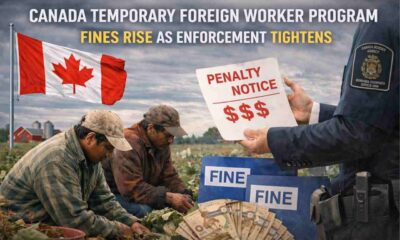Immigration Announcement
Proposed Immigration Reforms Raise Fears Among Rural Manitoba Businesses

Rural Manitoba businesses are sounding the alarm over proposed immigration reforms that could deepen already critical labour shortages. The federal government’s plan to reduce the number of temporary foreign workers to below 5% of Canada’s population by 2027 has many rural employers worried. For industries like agriculture and skilled trades, where local recruitment is already a challenge, these immigration changes could disrupt entire operations.
Immigration reforms in rural Manitoba capture the growing uncertainty among local employers who depend on international workers to keep their businesses running.
Labour Shortages Creating Strain in Rural Communities
Across rural Manitoba, businesses are finding it increasingly difficult to fill specialized positions. For example, agricultural equipment dealerships and service shops often spend months searching for qualified heavy-duty technicians. Without access to the temporary foreign worker program, those vacancies can last even longer, forcing existing employees to work extended hours and slowing down operations.
Courtney Matienzo, a Brandon-based recruiter for Mazergroup, says their company has around 425 employees across Manitoba and Saskatchewan, including nine temporary foreign workers. Those workers, she explains, are not just “extra hands” they are essential to keeping rural dealerships open and farmers supported.
“It’s not that we depend entirely on the program,” she explains, “but it helps fill key gaps that local hiring can’t.”
Businesses Urge for Region-Specific Immigration Reforms
The government’s proposed immigration reforms aim to limit the overall number of temporary foreign workers and international students, reducing them from over 7% in 2024 to less than 5% by 2027. While this policy is meant to create a more sustainable system, business owners argue that a blanket reduction doesn’t reflect regional needs.
Jennifer Ludwig, president of the Brandon Chamber of Commerce, believes a targeted approach is necessary. Her own company, Super Thrifty Drugs, has struggled to find pharmacists willing to work in rural areas; some roles have gone unfilled for over a year. International graduates, once approved, have become vital in filling those gaps.
She argues that immigration reforms in rural Manitoba should focus on where shortages exist, not just on national numbers. “You can’t compare downtown Toronto to Brandon or Dauphin,” Ludwig says. “We need solutions that reflect local realities.”
The Human Side of Labour Shortages
Behind every unfilled position is a ripple effect. Fewer service technicians mean longer wait times for farmers who rely on machinery during critical planting or harvest seasons. In healthcare and pharmacy sectors, it can mean reduced hours or limited services for small-town residents.
Karen MacDonald, vice-president of people and culture at Mazergroup, says the effects of labour shortages go beyond business. “Ultimately, it’s the farmer who suffers,” she notes, pointing out that when equipment sits idle, it impacts entire communities and local economies.
Municipal officials echo these concerns. Samuel Solomon, an immigration and workforce development specialist for the City of Brandon, highlights that past program like the Rural and Northern Immigration Pilot have been successful in attracting doctors, engineers, and skilled trades. He believes maintaining those pathways is essential to keep rural areas thriving.
Rural Employers Call for Balance and Clarity
Most employers agree that immigration reform is necessary to strengthen Canada’s workforce planning, but they want clearer rules and faster approvals for essential sectors. Bureaucratic delays in applications already slow recruitment efforts, sometimes leaving rural businesses waiting months for approvals.
For many, the proposed immigration reforms in rural Manitoba feel like a one-size-fits-all solution to a complex issue. Business owners say the goal should be to balance maintaining the integrity of the immigration system while recognizing the vital role international workers play in small communities. The conversation around immigration reforms in rural Manitoba continues to grow louder. Rural employers aren’t asking for special treatment, they’re asking for practical policies that keep farms running, pharmacies open, and local economies stable. As 2027 approaches, the government’s next steps on immigration will determine whether small communities continue to grow or face even deeper labour shortages.























